
Overview
The article titled "9 Essential Tips for Testing Pilot Success" serves as a vital resource for aspiring pilots seeking to elevate their performance in pilot evaluations. It underscores the significance of structured preparation, effective study techniques, and proactive engagement with instructors. These elements are essential, collectively driving higher success rates in pilot testing scenarios. By implementing these strategies, pilots can enhance their readiness and confidence, ultimately leading to more favorable outcomes in their evaluations.
Introduction
Aviation education represents a rigorous journey, characterized by various assessments that can ultimately determine a pilot’s future. Given the increasing number of aspiring pilots and the complexities surrounding FAA testing requirements, grasping the nuances of pilot evaluations has never been more critical. This article unveils essential strategies designed to not only enhance preparation for pilot tests but also optimize training programs, thereby improving overall success rates. What key elements must aspiring pilots master to navigate these challenges and emerge victorious in their training?
Parah Group: Optimize Your Flight Training Conversion Rates
To enhance your aviation conversion rates, implementing that prioritize and is essential. Just as supports DTC brands, can benefit from , refining messaging, and improving the overall experience to attract and retain more learners effectively.
- Understanding Psychological Triggers: Identifying what motivates potential students is crucial for developing more effective marketing and training approaches.
- Enhancing User Experience: and providing intuitive navigation on websites can significantly reduce friction and boost conversion rates.
- Data-Driven Insights: Utilizing analytics to track user interactions enables continuous improvement in training programs and marketing efforts.
- : Crafting compelling narratives that resonate with prospective students enhances engagement and drives enrollment.
- Feedback Mechanisms: Implementing and feedback loops yields valuable insights into user satisfaction and areas for improvement, directly informing enhancements in user experience and marketing strategies.
- Leveraging FAA Initiatives: With the FAA's commitment to improving aviation infrastructure, training institutions should align their offerings to capitalize on these developments, thereby enhancing user experience and conversion rates.
- Diversifying Offerings: Creating programs for the recreational aviation market, such as discovery excursions, can attract a broader audience and generate additional revenue streams.
- Building Strategic Partnerships: Collaborating with aviation nonprofits and youth organizations can amplify community impact and visibility, which is crucial for attracting learners.
By focusing on these strategies, flight training programs can establish a compelling value proposition that not only attracts new students but also fosters long-term loyalty.
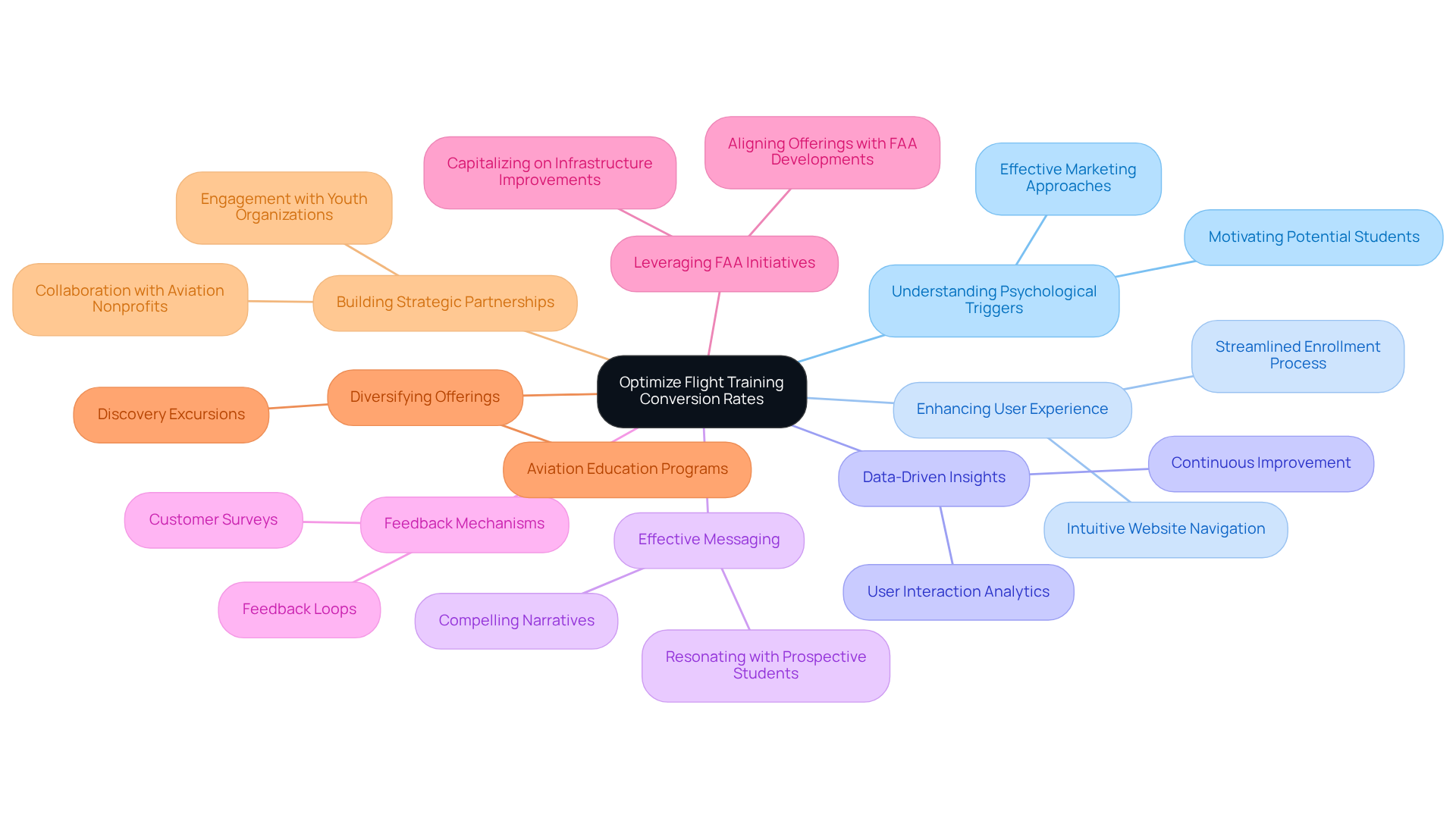
Understand the Types of Pilot Tests You Will Face
Aspiring pilots face a range of critical evaluations, including the , practical assessments known as checkrides, and stage reviews. Understanding the of each evaluation is essential for candidates to tailor their preparation strategies effectively.
The FAA Airmen Knowledge Test is a rigorous computer-based multiple-choice exam, necessitating a minimum score of 70% to pass. In 2023 alone, nearly 120,000 assessments were conducted, with the average score for the Instrument Rating evaluation reaching an impressive 86%. This underscores the importance of . Candidates are strongly encouraged to leverage resources such as online courses and practice assessments to fortify their knowledge.
, encompass both oral and flight assessments administered by FAA examiners. The overall in 2023 was 79.3%, with the Private Pilot exam reflecting a notably lower pass rate of 74.5%. This statistic emphasizes the necessity for candidates to prepare diligently, as the checkride evaluates proficiency in various maneuvers and adherence to aeronautical standards.
Stage checks serve as informal assessments throughout instruction, allowing educators to gauge a learner's progress and identify areas that require enhancement prior to the final practical evaluations. These assessments are vital for building confidence and ensuring readiness for more formal evaluations.
To significantly enhance their chances of success, aspiring pilots should implement . This includes:
- Creating study guides
- Participating in study groups
- Practicing mock checkrides
By thoroughly understanding the specific requirements and formats of each assessment, candidates can approach their training with both confidence and clarity.
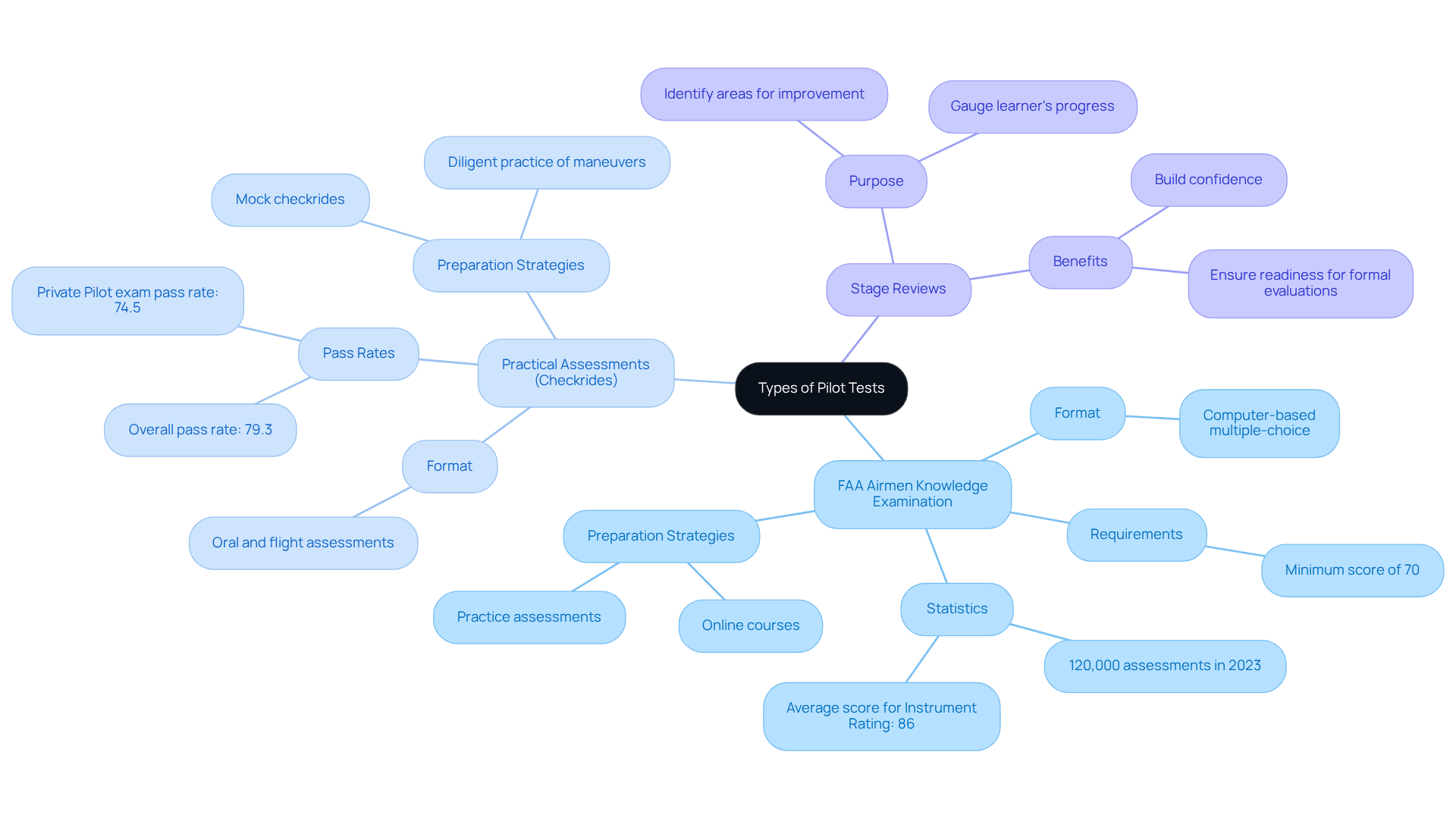
Prepare for Your Practical Test (Checkride) Effectively
To excel in your practical assessment, it is imperative to create a that encompasses a thorough review of flight maneuvers, regulations, and emergency procedures. Engaging in with your instructor is essential as a to replicate the examination environment, allowing you to focus on areas where you may feel less assured. This targeted approach not only builds the necessary skills but also instills the confidence required to perform exceptionally during the actual checkride.
As Winston Churchill wisely stated, ': it is the courage to continue that counts.' Embracing this mindset is crucial in your preparation journey.
Furthermore, with the number of FAA practical exams administered reaching 119,908 in 2023—a significant 27% increase from 2022—it is evident that interest in pilot certifications is on the rise. Participating in mock checkrides acts as a testing pilot, enhancing your and alleviating , which equips you to handle real-world scenarios with greater adeptness.
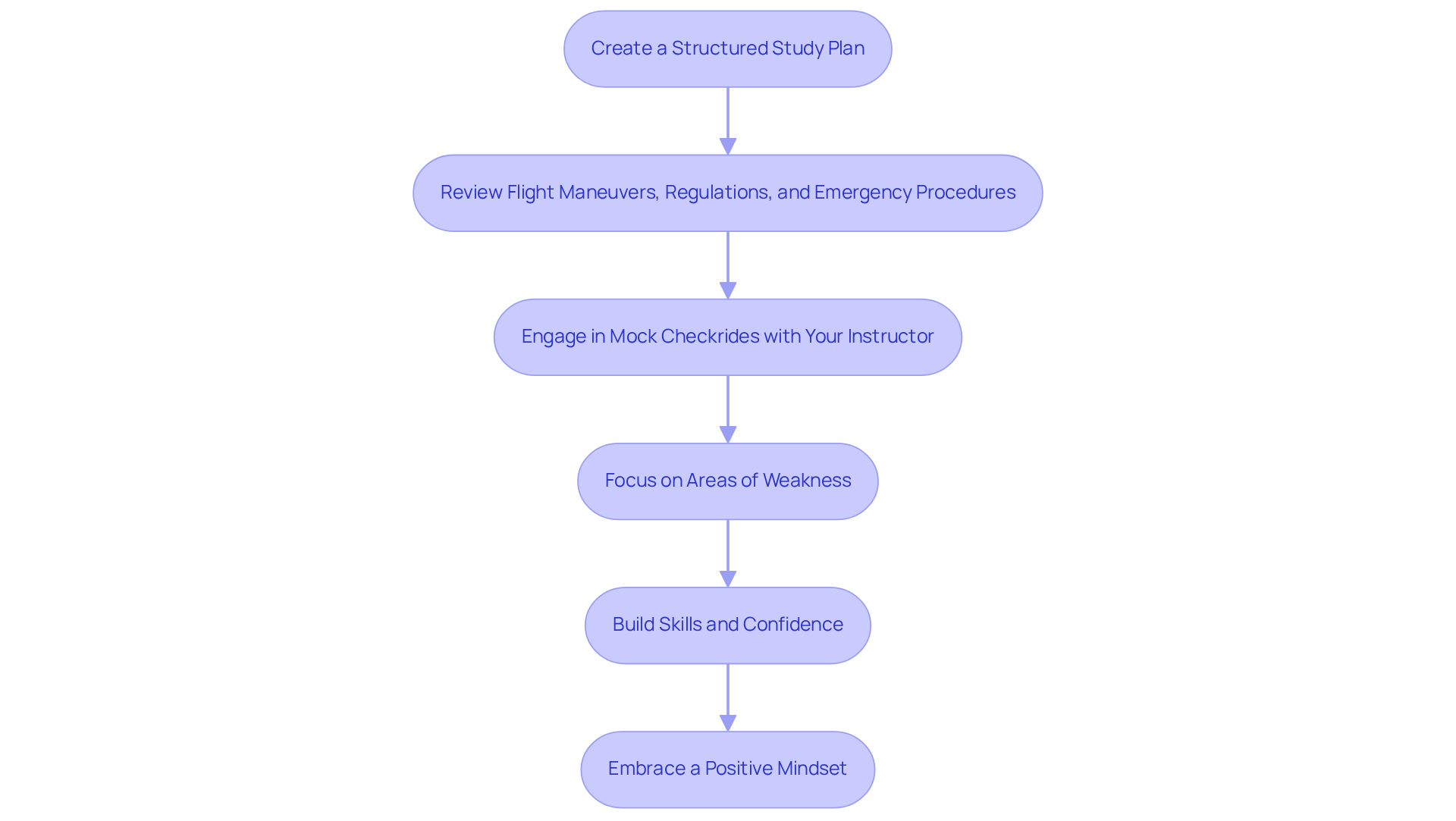
Master the FAA Airmen Knowledge Test for Success
To excel in the , it is essential to employ a diverse array of , including FAA-approved textbooks, online courses, and practice exams.
- Prioritize grasping over mere memorization; this deeper understanding will enhance your ability to apply knowledge in practical scenarios.
- Engaging in significantly enriches your learning experience, allowing you to discuss challenging topics and gain different perspectives from peers.
- Consistently completing is crucial for self-evaluation, helping you identify areas that require additional focus and ensuring you are well-prepared for the exam.
- Remember to bring valid and an endorsement from your instructor to the exam, as these are mandatory requirements.
- Additionally, be aware that personal items such as cellphones and smartwatches are prohibited during the test; plan accordingly to avoid any issues on exam day.
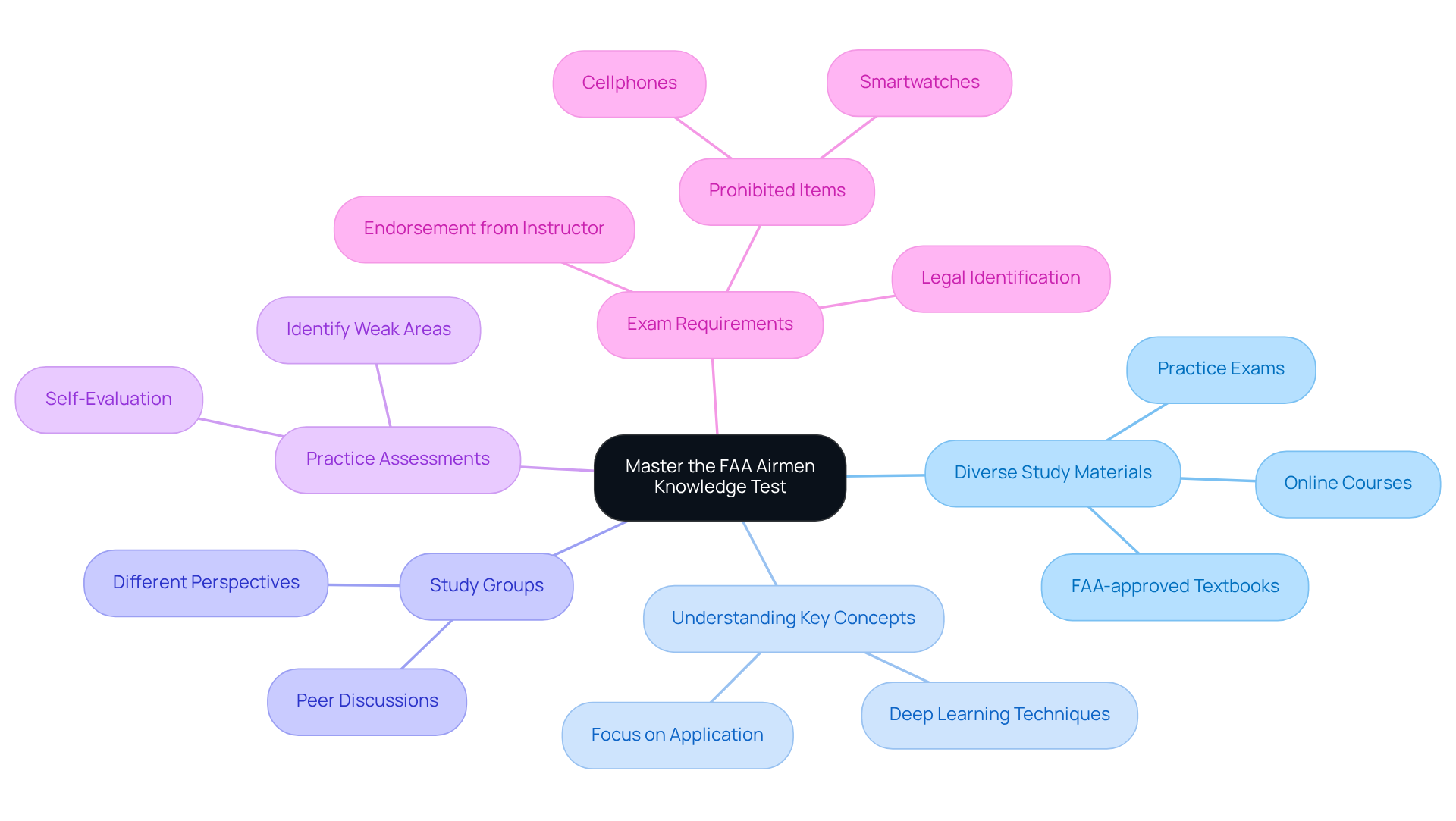
Utilize Stage Checks to Monitor Your Flight Training Progress
Incorporate into your practice regimen to systematically evaluate your skills and knowledge. These assessments are essential for obtaining , enabling you to pinpoint and address weaknesses before advancing. By leveraging insights gained from stage checks, you can refine your preparation focus and ensure alignment with your goals. Regular evaluations not only enhance your learning experience but also contribute to ; schools with maintain first-attempt pass rates around 90% or higher. This organized method fosters a , ultimately resulting in enhanced performance and confidence as you progress through your development. Furthermore, it's crucial to recognize that negative feedback from unsatisfactory stage checks can , highlighting the need for constructive evaluations. The provided by examining authority schools underscores the effectiveness of this approach.
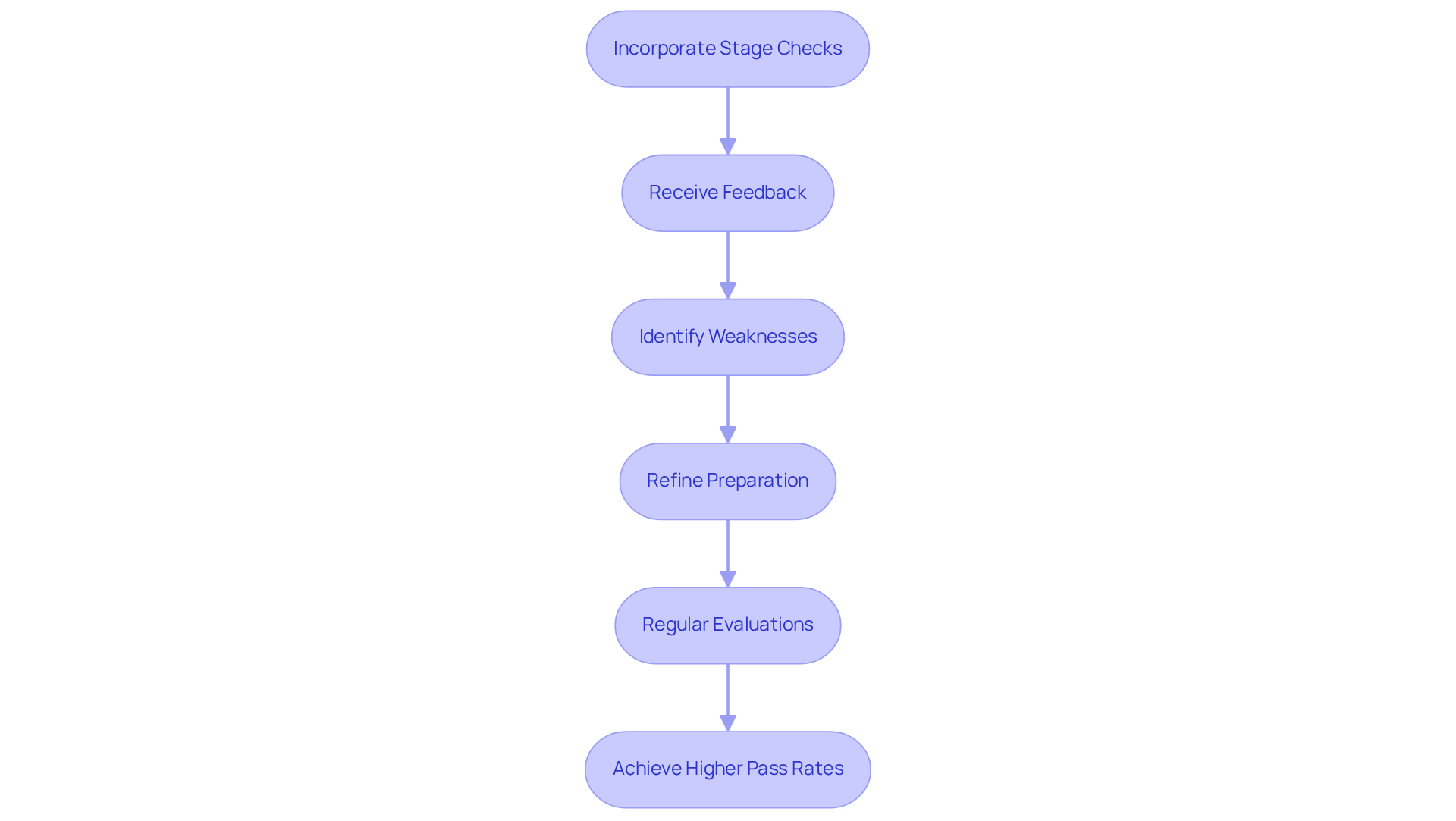
Implement Tips for Passing Your Pilot Tests
To enhance your success in pilot evaluations, it is crucial to prioritize throughout the exam. Allocate specific time blocks for each question to maintain a steady pace and prevent a rushed feeling. Carefully read each question to fully grasp its requirements, and eliminate obviously incorrect answers to narrow your choices.
Utilizing , such as deep breathing and visualization, can significantly alleviate , allowing you to approach the assessment with a calm mindset. Furthermore, ensure that you are well-rested prior to test day; tiredness can exacerbate anxiety and hinder performance. Studies indicate that 45% of individuals report anxiety adversely affecting their .
Familiarizing yourself with the in advance can also mitigate surprises, fostering a sense of comfort and preparedness on exam day. As Ray Altmann, Chief Flight Instructor at Epic Flight Academy, advises, "We tell our pilots to plan to arrive at least an hour early to check documents, preflight the aircraft, and get settled in."
By integrating these strategies—such as creating a —you can effectively manage anxiety and enhance your overall performance in the testing pilot examinations.
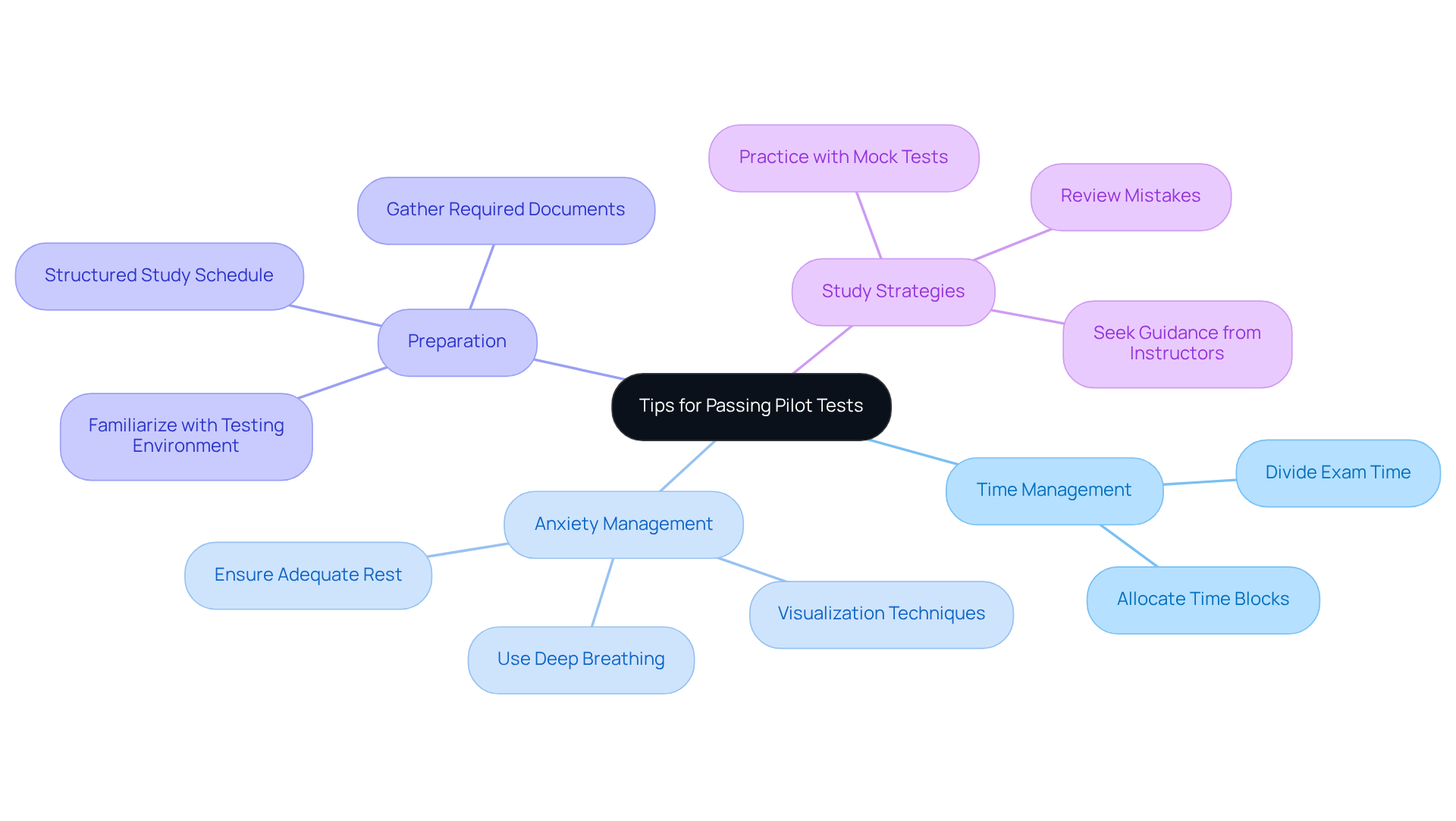
Leverage the Expertise of Your Flight Instructors
Actively engaging with your flight instructors is not just beneficial; it is . By asking questions and seeking constructive feedback on your performance, you tap into their wealth of experience, gaining and effective study strategies.
Research indicates a , underscoring the importance of . Establishing a and fosters a supportive learning environment that encourages growth and builds confidence.
Moreover, significantly improve learning outcomes, making it imperative to prioritize these connections throughout your educational journey. As Walter Alexander Raleigh aptly stated, ',' emphasizing the vital role instructors play in shaping successful aviators.
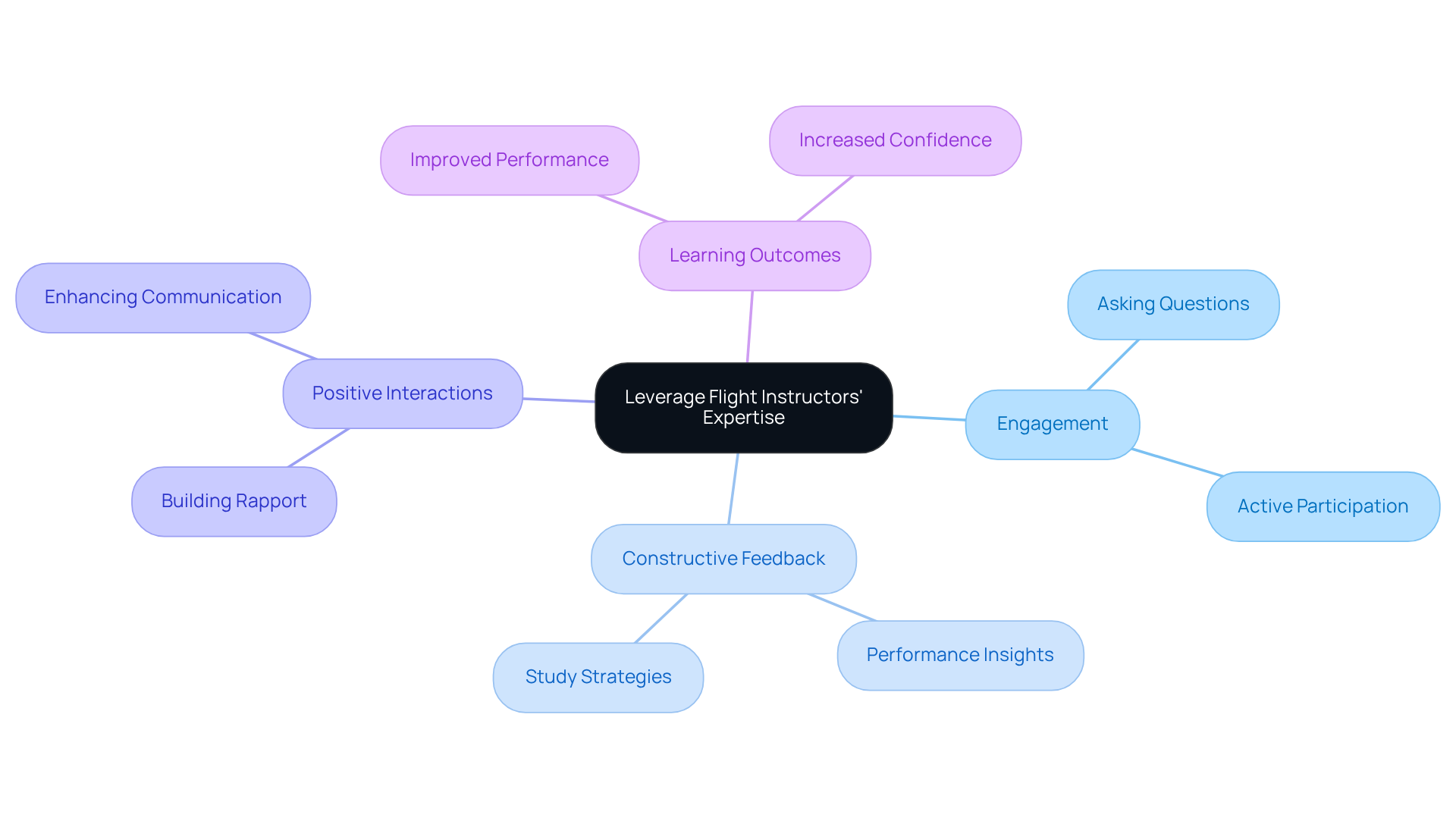
Engage in Ongoing A/B Testing for Training Improvement
Implement in your practice regimen by comparing various study methods or . Experimenting with different approaches to allows you to evaluate which method leads to better retention and performance. can significantly enhance your and overall performance. Notably, sectors focused on conversions, such as aviation instruction, have experienced .
For instance, the Portland Trail Blazers achieved a remarkable through A/B testing. Furthermore, companies that prioritize A/B testing often see a 61% average lift in , underscoring the effectiveness of this approach. By adopting a that emphasizes the importance of statistical knowledge in decision-making, you can identify the most effective development strategies. This ensures that your sessions are not only efficient but also tailored to maximize outcomes.
To initiate this process, consider establishing a basic that facilitates ongoing testing and sharing of insights across your team.
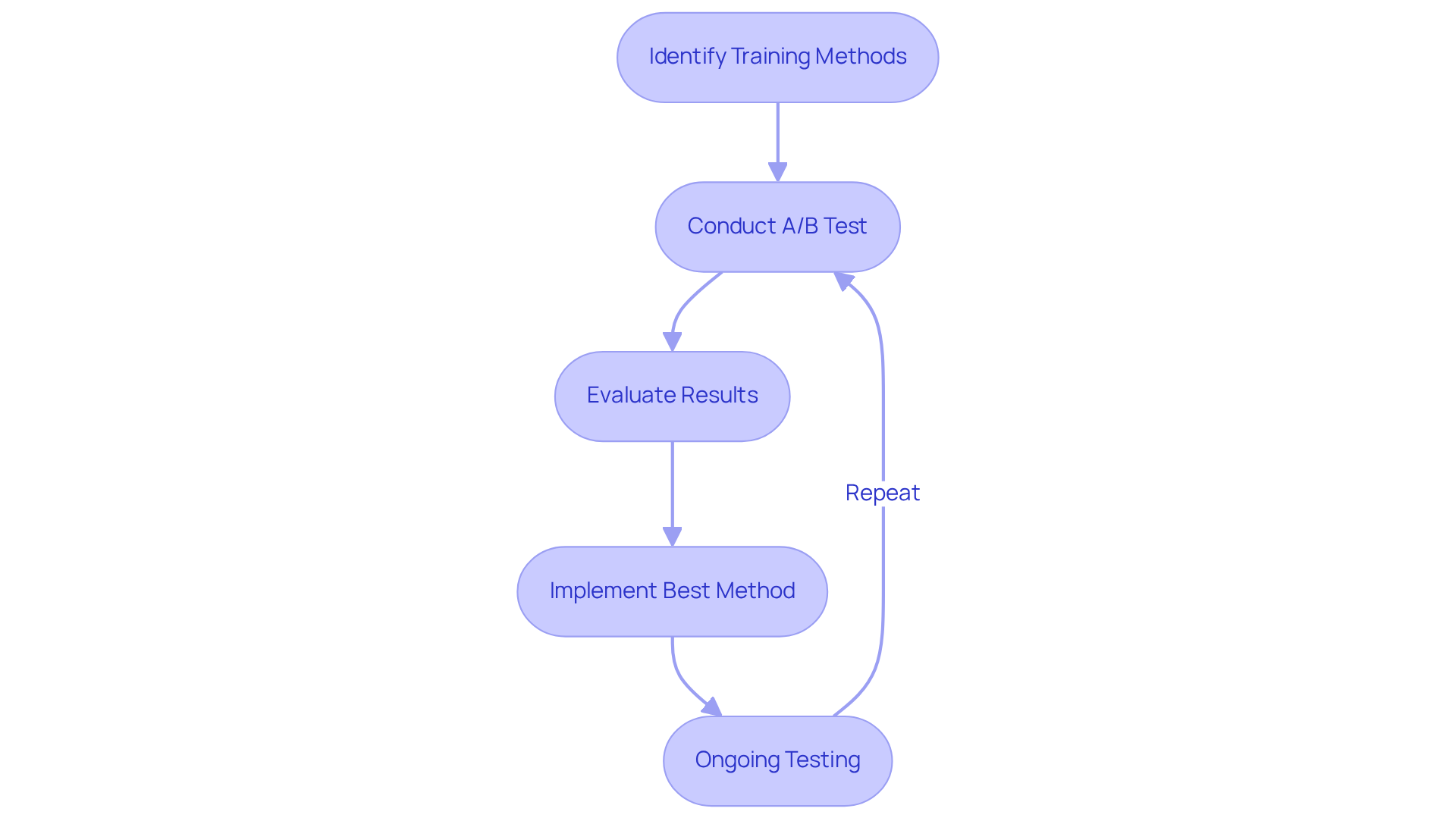
Conduct Customer Surveys to Enhance Training Programs
Conducting surveys among is essential for regarding their experiences and perceptions of the program. This data serves as a critical tool for within your . By consistently revising your instruction based on , you can achieve .
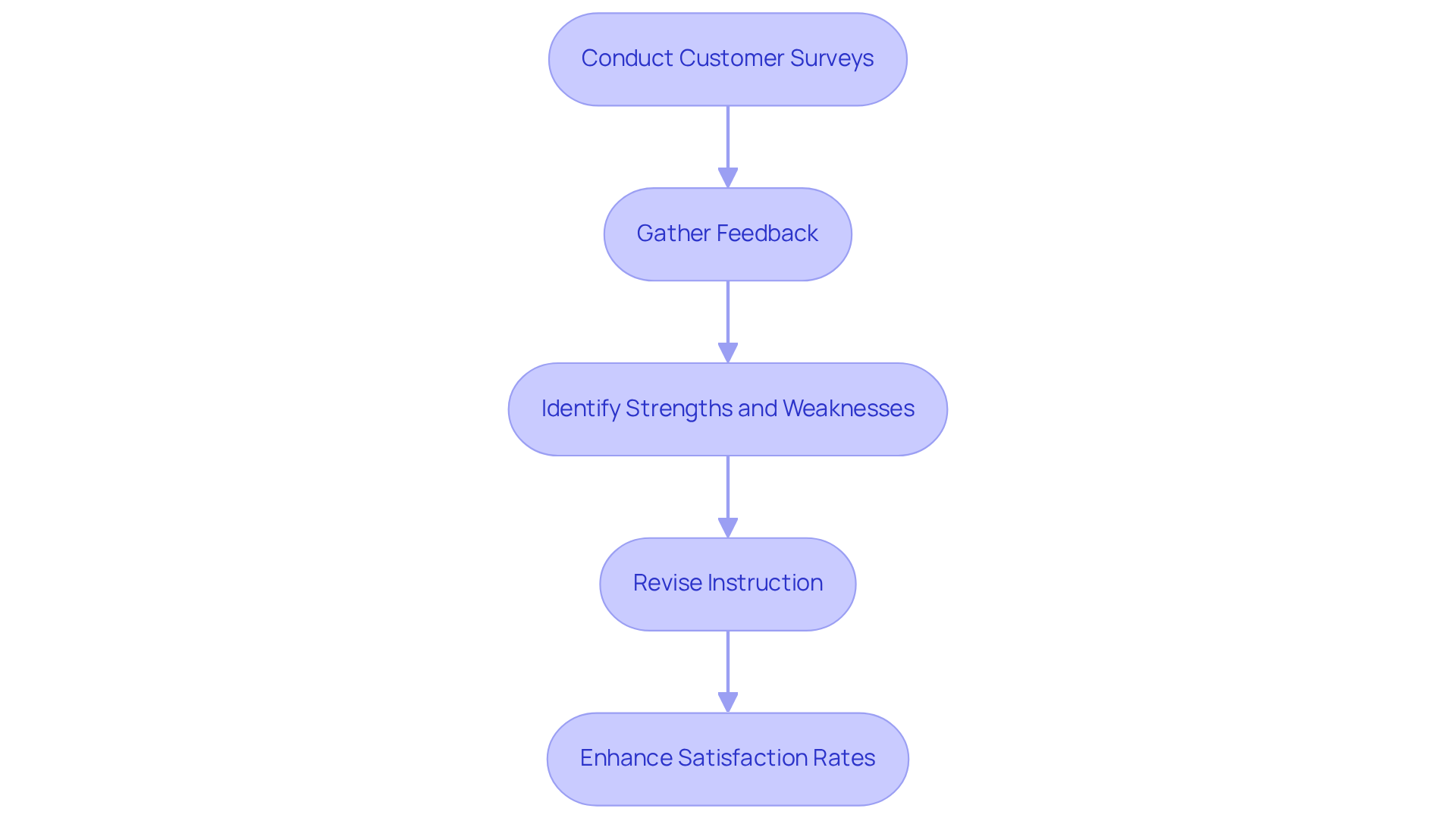
Adopt a Holistic Approach to Your Flight Training Journey
Adopt a holistic approach to your by such as:
- Technical skills
- Mental preparedness
- Physical fitness
Just as aligns all aspects of a client's website and marketing strategy for growth, recognizing how each element influences your is crucial. Strive to balance these components effectively; doing so will enhance your preparation experience and equip you for the .
Remember, as Amelia Earhart stated, "The most , is to do it." Taking is essential for .
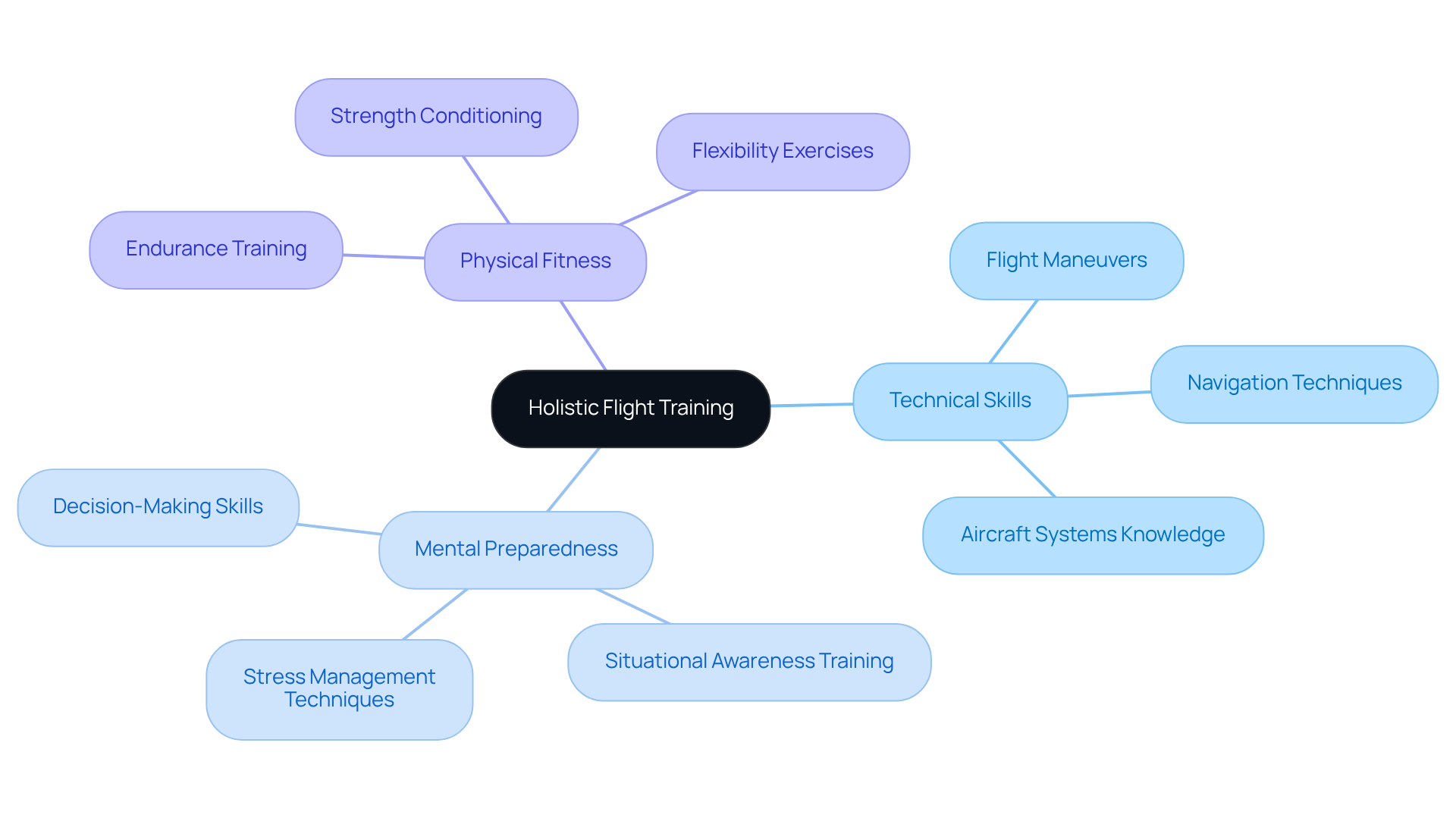
Conclusion
To achieve success in pilot training, a multifaceted approach that combines practical preparation, effective study strategies, and ongoing feedback is essential. By focusing on optimizing flight training conversion rates and understanding the nuances of various pilot tests, aspiring pilots can enhance their readiness and confidence. The insights shared highlight the importance of leveraging data-driven strategies, engaging with instructors, and incorporating holistic practices into the training process.
Key strategies discussed include:
- Understanding psychological triggers that motivate students
- Enhancing user experience during the enrollment process
- Utilizing feedback mechanisms to refine training programs
Additionally, the emphasis on structured study plans, mock checkrides, and the importance of stage checks underscores the need for thorough preparation and continuous improvement. Engaging with flight instructors and actively participating in A/B testing further contribute to a well-rounded training experience.
Ultimately, the journey to becoming a successful pilot requires dedication and a proactive mindset. By implementing these essential tips and strategies, aspiring pilots can navigate the challenges ahead and position themselves for long-term success in their aviation careers. Taking decisive action and embracing a comprehensive approach will not only enhance individual performance but also foster a culture of achievement within the aviation community.
Frequently Asked Questions
What strategies can flight training programs use to improve their conversion rates?
Flight training programs can enhance conversion rates by implementing data-driven strategies that focus on user experience, understanding psychological triggers, refining messaging, and providing a streamlined enrollment process.
Why is understanding psychological triggers important for flight training programs?
Understanding psychological triggers helps identify what motivates potential students, enabling the development of more effective marketing and training approaches.
How can user experience be enhanced in flight training programs?
User experience can be improved by streamlining the enrollment process and ensuring intuitive navigation on websites, which reduces friction and boosts conversion rates.
What role do data-driven insights play in flight training?
Utilizing analytics to track user interactions allows for continuous improvement in training programs and marketing efforts, helping to better meet the needs of potential students.
How can effective messaging impact enrollment in flight training programs?
Crafting compelling narratives that resonate with prospective students enhances engagement and drives enrollment.
What are feedback mechanisms, and why are they important?
Feedback mechanisms, such as customer surveys and feedback loops, provide valuable insights into user satisfaction and areas for improvement, informing enhancements in user experience and marketing strategies.
How can flight training institutions leverage FAA initiatives?
By aligning their offerings with the FAA's commitment to improving aviation infrastructure, training institutions can enhance user experience and conversion rates.
What is the benefit of diversifying program offerings in flight training?
Creating programs for the recreational aviation market, such as discovery excursions, can attract a broader audience and generate additional revenue streams.
How can building strategic partnerships benefit flight training programs?
Collaborating with aviation nonprofits and youth organizations can amplify community impact and visibility, which is crucial for attracting learners.
What types of evaluations do aspiring pilots face?
Aspiring pilots face the FAA Airmen Knowledge Examination, practical assessments (checkrides), and stage reviews, each requiring tailored preparation strategies.
What is the FAA Airmen Knowledge Test?
It is a computer-based multiple-choice exam that requires a minimum score of 70% to pass, with a significant number of assessments conducted annually.
What are checkrides, and what do they entail?
Checkrides are practical evaluations that include both oral and flight assessments administered by FAA examiners, assessing proficiency in various maneuvers and adherence to aeronautical standards.
What are stage checks?
Stage checks are informal assessments throughout flight instruction that allow educators to gauge a learner's progress and identify areas needing improvement before final evaluations.
How can aspiring pilots prepare effectively for their practical tests?
Aspiring pilots should create a structured study plan, engage in mock checkrides, and focus on reviewing flight maneuvers, regulations, and emergency procedures to build skills and confidence.
What was the trend in FAA practical exams in 2023?
In 2023, the number of FAA practical exams administered reached 119,908, marking a 27% increase from 2022, indicating a rising interest in pilot certifications.
FAQs











